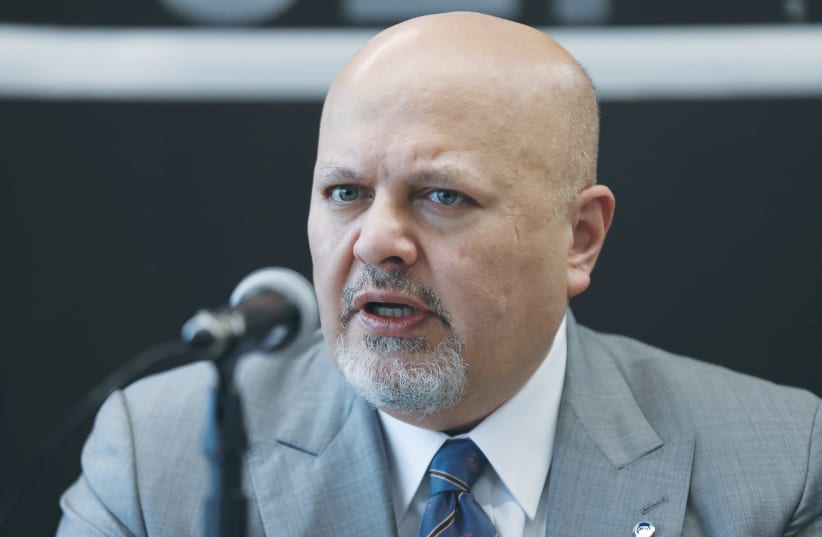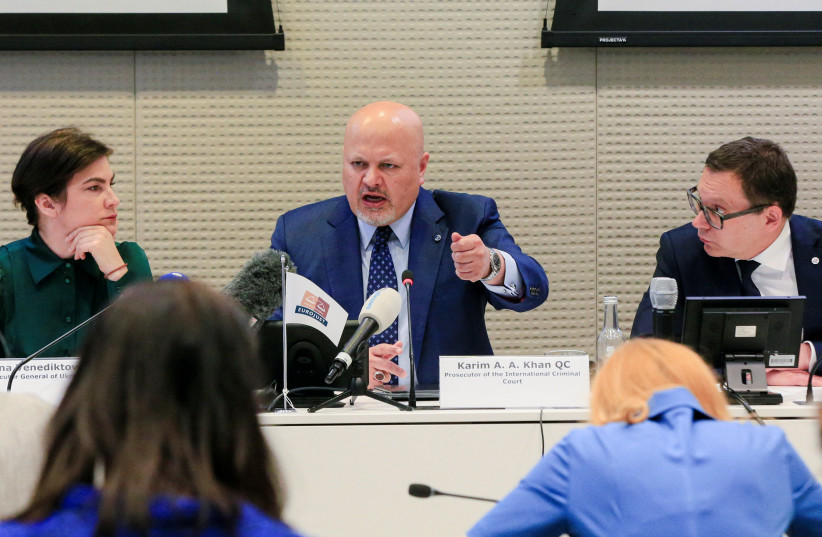Much ink was used in a myriad of publications a year ago to speculate whether newly-inaugurated International Criminal Court Chief Prosecutor Karim Khan would be better or worse for his office’s preexisting war crimes probe of Israel than his predecessor, Fatou Bensouda, who initiated it.
While there was no clear proof or consensus, and there were many voices who said he was likely to follow Bensouda’s path of diving deeper into the Israeli-Palestinian conflict, there were also some top Israeli officials who were cautiously optimistic.
They said he might be more a political pragmatist who would view Israel-Palestine as a can of worms.
Others said he would have no choice but to issue arrest warrants for Israelis both because of the hostility to Israel at the UNHRC and to push back against charges that the ICC is afraid to charge non-Africans.
One year later the jury is still out, but there have been some sighs of relief in Jerusalem.
For one, Khan has not issued a single public statement or taken a single public action regarding Israel-Palestine to date.
Many Israeli officials believe that Bensouda would already have taken actions and maybe even have issued arrest warrants had she continued in office past her nine-year term.
But The Jerusalem Post has learned that the Jewish state should not let its guard down yet.
Moving slowly on the file might mean that Israel is out of the woods.
Similarly, the Post has learned that the Turkey-Northern Cyprus situation may not be off Khan’s radar screen, even if he has also been silent to date on that.
Certainly, silence for a full year shows that Israel-Palestine was not at the top of his priority list.
Looking at what was, can also help forecast the future some.
Khan's progress so far
ON THE one hand, Khan let the US off the hook from his probe into war crimes in Afghanistan, ending a terribly destructive minefield between America and The Hague.
He decided to concentrate on the crimes committed by the Taliban and ISIS-Khorasan and in effect to refrain from investigating the allegations of crimes committed by the US forces.
His reasoning sounded very pragmatic and related to limited resources and potential for receiving cooperation from the US after years of conflict between the sides and seemingly endless rounds of court rulings batting the case to and fro.
Some said that the same rationale of avoiding a high profile fight with little likelihood of success might lead Khan to abandon the case against Israelis.
Making the Israel probe low priority could also be attributed to the complexity of the investigation regarding the Jewish state and the fact that it concerns actions whose criminality is less clear than in other cases.
On the flip side, Khan’s leaving the US alone, could leave the Biden administration with less of an appetite to fight the ICC on Israel’s behalf.
In any case, Biden was never going to antagonize the ICC for going after Jerusalem the way the Trump administration did.
Also, the new prosecutor may find it convenient to target Israel as a way of alleviating criticism of being overly focused on Africa following his decision to close the case against America.
ALL OF this might summarize the state of play until February.
That’s when Russia’s invasion of Ukraine radically altered the arena.
Russia-Ukraine war
Since that invasion, Khan has seemed to position the Court to have a substantial influence on real-time confrontations and to help protect the world from descending into even darker shadows of war.
While humanitarians everywhere may be excited to see the ICC taking on the Russian bear that it had avoided for years, this may also increase its legitimacy and make it harder for Israel to try to isolate the Court in any confrontation.
There are also new precedents being set or strengthened in the Russia case which go against Israel.
One claim by the Jewish state is that the ICC cannot probe it because it is not signed on to the Court’s Rome statute.
However, Russia is not signed on either, and the whole world seems to be supporting the probe of Moscow on the grounds that Ukraine filed an ad hoc acceptance of crimes committed on its territory.
This could assist “Palestine” with making the same move on Israel.
Khan has also gotten ICC member states more directly involved in the process, with 41 nations supporting it and 14 sending staff to assist with collecting evidence.
If Israeli allies in Europe who are ICC member states asked to collect evidence within Israel or Gaza against it, would it be harder to turn them down than “just” Khan standing on his own?
Moreover, some of the crimes he is probing in the Russia case are far more minor, such as extended inhuman detention and deportation, as compared to crimes like genocide.
This could also leave Israel more vulnerable to probes for more minor crimes on the broad war crimes list, especially since it uses extensive administrative detention and house demolitions (albeit not usually together).
ONE NEW precedent from the Russian file which could be “good” for Israel – in relative terms – has been Khan’s decision to publicize his three arrest warrants issued for top Russian officials.
Jerusalem wants no arrest warrants, but publication, versus the usual practice of issuing the warrants secretly, could at least make it easier for Israelis who might be at risk in the future to avoid arrest.
Yet again, the issuing of the first arrest warrants for anyone outside of Africa makes it more likely that Israelis could face arrest.
Is the shift of focus a good thing?
Will Khan’s seeming shift to focus on more recent crimes save Israel from prosecution for the 2014 Gaza War, or make it more likely that it may be prosecuted for recent killings of Palestinians during conflicts and settlement enterprise activity?
An entirely different possibility is that the ICC prosecutor simply keeps the file on Israel open as a source of deterrence from fighting future wars, but without moving forward – something which happened regarding Colombia for a very long time before the file was recently closed.
One thing is for sure: Newly knighted (as of Wednesday) Deputy Attorney-General for International Affairs Gilad Noam has his work cut out for him.

